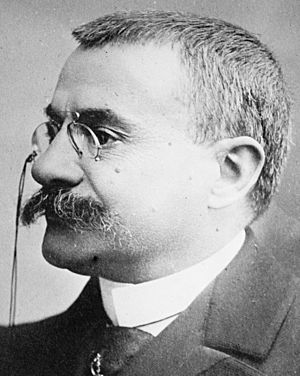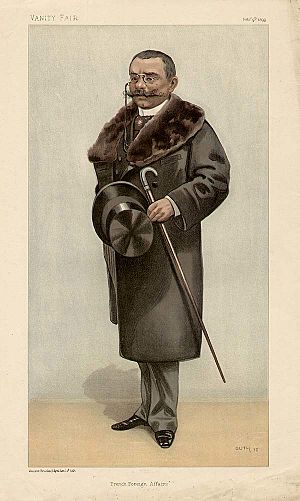Théophile Delcassé facts for kids
Quick facts for kids
Théophile Delcassé
|
|
|---|---|
 |
|
| Minister of Foreign Affairs | |
| In office 28 June 1898 – 6 June 1905 |
|
| Preceded by | Gabriel Hanotaux |
| Succeeded by | Maurice Rouvier |
| In office 26 August 1914 – 13 October 1915 |
|
| Preceded by | Gaston Doumergue |
| Succeeded by | René Viviani |
| Minister of War | |
| In office 9 June 1914 – 13 June 1914 |
|
| Preceded by | Joseph Noulens |
| Succeeded by | Adolphe Messimy |
| Minister of Marine | |
| In office 2 March 1911 – 21 January 1913 |
|
| Preceded by | Auguste Boué de Lapeyrère |
| Succeeded by | Pierre Baudin |
| Minister of Colonies | |
| In office 30 May 1894 – 26 January 1895 |
|
| Preceded by | Ernest Boulanger |
| Succeeded by | Émile Chautemps |
| Personal details | |
| Born | 1 March 1852 Pamiers, Ariège, France |
| Died | 22 February 1923 (aged 70) Nice, Alpes-Maritimes, France |
| Political party | Radical |
Théophile Delcassé (born March 1, 1852 – died February 22, 1923) was an important French politician. He is best known for serving as France's foreign minister from 1898 to 1905. During this time, he worked hard to create strong alliances with other countries. These alliances included Russia and Great Britain. His efforts led to the famous Entente Cordiale, a friendly agreement between France and Britain. Delcassé was a member of the Radical Party.
Contents
Early Life and Political Beginnings
Théophile Delcassé was born on March 1, 1852, in a town called Pamiers, in the Ariège area of France. He started his career by writing articles about international affairs for newspapers. These articles appeared in République Française and Le Temps.
In 1888, he was elected as a local councilor in his home region. The next year, in 1889, he became a deputy (a type of representative) for Foix in the French parliament. He was known as a loyal follower of the politician Léon Gambetta.
Working with French Colonies
Delcassé became an under-secretary for the colonies in 1893. This meant he helped manage France's territories overseas. He worked to make the French colonial office a separate government department. This department would have its own minister.
In 1894, he became the minister in charge of the colonies. He greatly encouraged France's colonial efforts, especially in West Africa. He helped organize the new colony of Dahomey. He also sent the Liotard mission to explore the upper Ubangi area. Delcassé believed the French navy should protect and help develop these colonies.
Becoming Foreign Minister
In June 1898, Delcassé became the Foreign Minister of France. He held this important job for many years under different leaders.
One of his first challenges was the Fashoda Incident in 1898. A French captain had occupied a town called Fashoda in Sudan. This caused tension with Britain. Delcassé took full responsibility for the situation. In March 1899, he reached an agreement with Britain. This agreement helped France expand its large colonial empire in North-West Africa.
In the same year, he helped settle peace talks between the United States and Spain. This showed his skill in international diplomacy.
Building Important Alliances
Delcassé worked hard to improve France's relationships with other countries. He made relations between France and Italy much better. He also strongly supported France's alliance with Russia. He visited Saint Petersburg, Russia, in 1899 and again in 1901.
In June 1900, he made an agreement with Spain. This agreement set the borders for French and Spanish lands in West Africa.
His biggest achievement was creating the Entente Cordiale with Great Britain. This friendly agreement solved many old disagreements between the two countries. These issues included control over Egypt, Newfoundland, and Morocco. This agreement was a very important step in European politics.
Dealing with Germany
At first, Delcassé was open to finding common ground with Germany. However, Germany did not respond to his efforts. Because of this, he became very anti-German. The German Emperor, Kaiser Wilhelm, even called him "The most dangerous man for Germany in France."
Germany became suspicious of the growing friendship between France and England. In 1905, Germany caused a crisis over French policy in Morocco. This situation became very serious. Germany pushed for Delcassé to resign from his position. He left his job in June 1906.
In 1909, Delcassé was asked to lead a group studying the French navy. Their report, finished in May 1909, found that the navy was not ready for war. It also said that the navy's management was disorganized.
On March 2, 1911, Delcassé became the Minister of Marine (in charge of the navy). He pushed for closer cooperation between the British and French navies. This arrangement was a key reason why Britain sided with France against Germany when World War I began.
Solving the "Powder Crisis"
On September 25, 1911, a French battleship named Liberté exploded in Toulon harbor. This accident killed 210 men and seriously injured 136 others. The explosion was caused by unstable gunpowder.
Delcassé ordered that all ammunition made before 1907 be replaced. Older ammunition was removed from ships. Newer, safer explosives were used instead. Efforts continued to improve the gunpowder. Thanks to these changes, there were no more major disasters. The "powder crisis" was fully solved by 1914.
Later Political Roles
Delcassé left his role as Minister of Marine in January 1912. He was asked to become Prime Minister and Foreign Minister but declined. However, he agreed to stay in the government as Minister of the Navy.
In January 1913, Delcassé decided to run for president of France. He did not win the election. After the election, he was offered other government positions but declined them.
Soon after, he was appointed as the French Ambassador to Russia. Later, on August 26, 1914, he became the Minister of Foreign Affairs again. This was at the very beginning of World War I. Delcassé resigned from the government on October 14, 1915. He left due to different opinions and his own poor health.
Awards and Recognition
Théophile Delcassé received several important awards from different countries:
 Belgium: Grand Cordon of the Royal Order of Leopold, 1900
Belgium: Grand Cordon of the Royal Order of Leopold, 1900 Principality of Bulgaria: Grand Cross of the Order of St. Alexander, 1902
Principality of Bulgaria: Grand Cross of the Order of St. Alexander, 1902 Spain: Grand Cross of the Order of Charles III, with Collar, July 9, 1900
Spain: Grand Cross of the Order of Charles III, with Collar, July 9, 1900 United Kingdom: Honorary Grand Cross of the Royal Victorian Order, May 4, 1903
United Kingdom: Honorary Grand Cross of the Royal Victorian Order, May 4, 1903
Delcassé in Movies
Théophile Delcassé has been shown in movies:
- He was played by Harald Paulsen in the 1941 German film Ohm Krüger. In the movie, he is called the "French Foreign Minister."
- He was played by Oliver Borlen in the 2012 Filipino film, El Presidente.
See Also
In Spanish: Théophile Delcassé para niños


